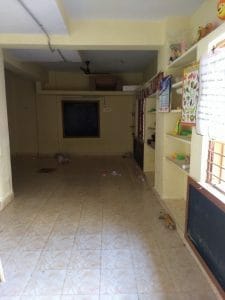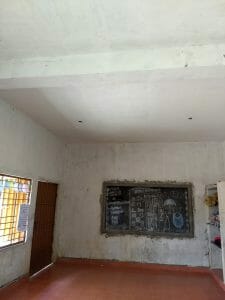Rows of eight-storied buildings on both sides of Ezhil Nagar Main Road of Perumbakkam paint an impressive picture of the resettlement colonies constructed by the Tamil Nadu Slum Clearance Board (TNSCB). The residents, who were evicted from the slums alongside Adyar and Cooum Rivers after the 2015 floods, live in these buildings which are apparently quite well-maintained.
But is life really as rosy for the residents here? The glaring deficiencies can only be spotted once one steps inside these colonies and looks deeper.
In an earlier article on the Perumbakkam resettlement, Citizen Matters exposed the pathetic conditions in a primary school that is functioning from one of the residential apartments, defying several norms under the Right to Education (RTE) Act. In a recent development, the school administration is facing the wrath of the people for asking students to urinate in the open. “They are just primary school children. How does it matter?” — this is what teachers allegedly had to say, when parents asked about such orders.
It is not just about the school. The resettlement is just not child-friendly, as the Balwadis too testify. The ones in the colony violate the very objectives of the Integrated Child Development Services (ICDS) in Tamil Nadu.
Inadequate and ill-equipped
Firstly, the number of Balwadi centres is rather less for the child population in the colony; to add to it, they are miserably maintained. There are only seven ICDS centres besides a creche maintained by an organization called Uravugal.
“For a population of nearly 95,000 people (estimated figure after the complete eviction), there should be a minimum of 118 ICDS centres. However, space has been allotted only for 20, of which only seven of them have come up till now,” says Vanessa Peter of Information and Resource Centre for the Deprived Communities.
Only recently did an organization called World Vision revamp four ICDS centres and equip them with new child play equipment. They painted the walls of these centres, donated new chairs and put up charts of alphabets and numbers on the empty walls. The other three centres, however, do not share the same features. They lack even the most basic amenities such as power supply, water connection and a child play area.
Two of these centres in H block and Q block of the Old Perumbakkam colony have no electricity, for example. Even with scorching temperatures in the city, kids, aged 3 to 5, sit in the suffocating classrooms with no electricity. Beads of sweat roll down their faces, as they run around the centre that resembles a ‘godown.’
On particularly hot days, parents ask the in-charge to send their wards home, as it is too ‘hot’. “We have been requesting the electricity board officials to provide a power connection. They have directed us to various departments – from the slum board to the EB office in Chitlapakkam. Our efforts have not yielded fruit as our children continue to suffer,” said a parent, seeking anonymity.
An illiterate teacher
But there is worse to contend with. The in-charge in one of the centres, who acts as a teacher is illiterate. As per ICDS norms, each Balwadi should be manned by a teacher and a help, who would cook and clean. Due to the employee crunch, an illiterate help from one of the Balwadis is working as in-charge of a centre in A block.
“She has never written a word on the board, even when parents asked her to. Neither has she made a child read anything. I have seen her lock the centre with kids inside and go away for more than an hour,” says a youngster from the resettlement. “The Balwadi is nothing but a mini jail for students as they are allowed to play only when there is a monthly inspection,” the youngster added.
The responsibility of TNSCB is only to construct the buildings, the department handling the noon meal programme has the task of manning the ICDS centres and providing healthy food. The office has not responded to calls made by Citizen Matters.
Nutritious meals — a far cry
On the Friday afternoon that this reporter visited, each child was served hot sambar rice and two large pieces of potatoes. The centre in-charge said that the children were provided with eggs thrice a week, a statement that many parents disagreed with. “We send lunch from home as they don’t provide good food. There are not enough plates either for the kids to eat,” shared one parent.

At 12.30 pm, a Balwadi remains deserted as the in-charge has sent the children home. Pic: Laasya Shekhar
Those in charge of the Balwadis, many of whom mistook this reporter as a social worker, requested for funds to buy amenities such as mattresses, plates, and charts. “Denial of facilities in the ICDS centres are a violation. While one of the prime objectives of these centres is to prevent anemia among children, they pay mere lip service to the activity at the ground level. Children at these centres who belong to marginalized communities are sufferers, due to the negligence of the government officials,” says A Devaneyan, a child rights activist.
Complaints unheeded
Activists say that complaints to various departments about the violations go unaddressed. In a complaint dated November 23 2017 to the Chairperson of the Tamil Nadu State Commission for Protection of Child Rights, Vanessa Peter raised several issues pertaining to children, including post-eviction trauma and the lack of adequate Balwadi centres. However, there has been no reply till date.
Meanwhile, an official of the TNSCB said that the board finds it tough to meet the original objectives of constructing 20 ICDS centres, due to insufficient funds. “There is no cooperation from other departments to improve the existing facilities,” the official added. ICDS centres in the Perumbakkam resettlement thus continue to operate at variance with the purpose with which they were set up.
